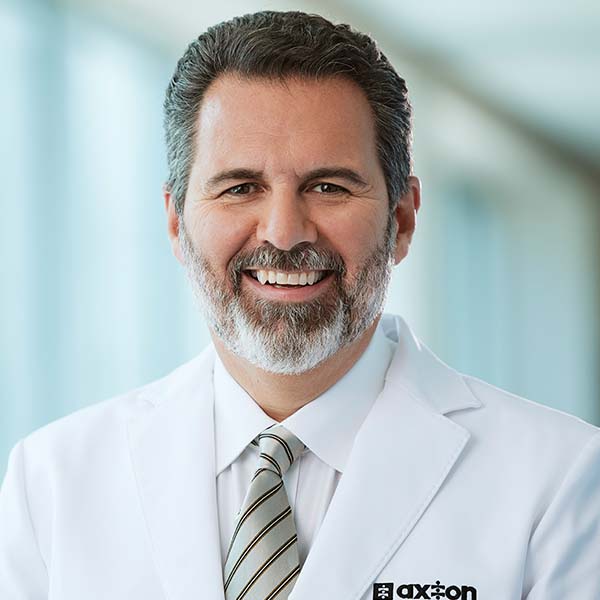Neck Surgery
Neck surgery may be an option to help treat neck pain. Neck pain is a common complaint that has many causes and possible treatments. Muscle strain, wear and tear on joints, nerve compression, injuries, and diseases can restrict your movement and cause symptoms like pain and numbness. At its worst, neck pain can be completely debilitating.
If you suffer from neck pain, your doctor may recommend specific tests to help pinpoint the cause, including:
- Blood tests
- CT scan
- EMG
- MRI
- X-rays
Self-care like exercises or over-the-counter pain relievers can ease the pain in many cases. For others, physical therapy, transcutaneous electrical nerve stimulation (TENS), traction, immobilization, or steroid injections may provide relief.
If none of those treatments help, neck surgery could be an option.

What Can Neck Surgery Treat?
Neck surgery may be an option to relieve pain caused by a compressed nerve root or spinal cord. Neck surgery can help:
- Alleviate pain
- Decompress the spinal cord
- Improve alignment of the spine
- Maintain the range of motion in your neck
- Prevent damage from degeneration
- Remove a damaged disc that is irritating a nerve
- Stabilize the cervical (neck) spine
Types of Neck Surgery
The best surgery for you depends on your symptoms and the type of injury to your neck. Common procedures include:
Anterior cervical discectomy and fusion (ACDF)
ACDF is a type of surgical decompression. During the procedure, the surgeon removes a damaged disc through the front of the neck. It is then replaced with a bone graft and/or implant to stabilize the spine. ACDF can treat a herniated disc, cervical degenerative disc disease, bone spurs from osteoarthritis, and spinal stenosis.
Cervical artificial disc replacement
An artificial disc can be implanted in place of a damaged disc to relieve nerve compression and maintain range of motion at the repair site. While disc replacement doesn’t add or improve movement, it helps maintain the neck’s natural functioning. Removing the damaged disc can relieve chronic pain, numbness, tingling, and weakness in the arm that is caused by a compressed nerve in the neck.
Spinal decompression
Spinal decompression includes several techniques to relieve the symptoms of pressure on the spinal cord or a nerve root, which can include:
- Bladder/bowel issues
- Numbness
- Pain
- Paralysis
- Tingling
- Unsteadiness
- Weakness
It may be necessary to remove or restructure part of a disc or vertebrae or remove a bone spur that’s irritating a nerve. Surgery can expand the spinal canal, relieve disc compression, and remove bony growth. Common techniques include:
- Corpectomy – Removal of the vertebra body and discs.
- Discectomy – Removal of part of a disc to relieve pressure on a nerve root.
- Laminotomy – Removal of part of the spinal canal, called the lamina, to create more space in the spinal canal for the nerves.
- Foraminotomy – Removal of bone and other tissue to expand the openings where nerve roots branch out from the spinal cord.
- Osteophyte removal – Removal of bone spurs.
One or more techniques may be used in a single surgery, including cervical fusion to stabilize the cervical spine.
Procedure
Minimally invasive neck surgery is done under general anesthesia. Afterward, you’ll rest in a recovery area until it’s safe to go home. You will need a driver because of the anesthesia and may initially need some help at home. You will probably need to wear a cervical collar to protect and stabilize your neck during recovery.
Depending on your procedure, you may not be able to return to your normal activities for a few weeks to several months. It can take as long as a year for bones to heal after fusion.
You may need physical therapy to strengthen your neck after surgery.
Every surgery is different – your care team will talk to you about your instructions. It is critical you follow your post-operative instructions to achieve your best results and recovery.
Risks
Every surgery carries some risks. Possible complications with neck surgery include:
- Bleeding
- Changes to your voice
- Infection
- Injury to the esophagus
- Nerve damage
- Reaction to anesthesia
- Spinal cord damage
Is Neck Surgery an Option for Me?
Each person’s condition is unique. Neck surgery may be an option for you if other treatments haven’t worked. Your doctor will thoroughly assess your condition and discuss the possibilities with you.
If you think you may need neck surgery, schedule a consultation appointment today!

